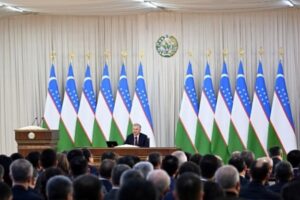
The international news portal Euronews has published an article about Uzbekistan’s large-scale program aimed at developing artificial intelligence infrastructure and data centers. The article emphasizes that the country offers significant tax breaks, access to cheap electricity, and support for renewable energy projects, hoping to attract more than €85 million in foreign investment in the first phase.
Euronews pays particular attention to the choice of Karakalpakstan as a key location. The region is seen as a promising center for large AI projects due to its energy advantages, cool climate, and availability of free land resources. Journalists note that the new projects will use energy-efficient and low-water cooling systems that meet the environmental conditions of the region, which has been affected by the drying up of the Aral Sea.
According to the Ministry of Digital Technologies and Research and the UNDP, the ongoing modernization of fiber optic and telecommunications infrastructure is increasing the country’s digital potential and making it attractive to major players in the industry. According to the publication, the Uzbek government is counting on an influx of investment in the artificial intelligence sector, the creation of high-tech jobs, and the development of related industries, from logistics to engineering services.
Euronews also notes that the selection of projects will be based on their export potential, focus on green energy, and plans for training local personnel. The potential of Karakalpakstan as a future hub for the export of computing power and cloud services to countries in the region is highlighted separately.
According to the portal, the initiative is integrated into Uzbekistan’s broader strategy to create a full-fledged artificial intelligence ecosystem by 2030. The plan envisages attracting more than €860 million in investments, opening new AI laboratories, forming technology clusters, and launching more than 100 AI-based projects, including solutions based on renewable energy sources. By 2030, the country intends to increase its IT services exports to €4.3 billion and strengthen its position in the global technology market.

On November 10, the President of Uzbekistan met with medical and pharmaceutical workers, congratulating them on their professional holiday, Medical Workers’ Day.
Over the past five years, approximately $624,000 has been allocated to specialized medical centers, and thousands of pieces of modern equipment have been purchased. At the same time, the efficiency of its use is only 25%. The president emphasized the need to prioritize the development of digitalization, the modernization of clinical protocols, the introduction of advanced diagnostics and prevention, as well as the formation of professional teams in the regions.
Now, the directors of 26 specialized centers, heads of regional and district health care systems, and heads of family clinics will work according to monthly plans, visit problem areas and mahallas, analyze the causes of morbidity, propose solutions, and train local doctors. Daily meetings with healthcare managers will be held at the mahalla level, and each manager will be required to ensure attentive and prompt treatment of patients.
Starting in the new year, the procedure for appointing heads of medical institutions will change: the positions of director and chief physician will be separated, and entrepreneurs with management training and proven results will be eligible for leadership positions.
The incentive system will also be modernized: the best managers will be awarded titles, orders, medals, and cash bonuses of up to $2,497, and $41,000 will be allocated to improve the infrastructure of institutions. The best specialists will be sent abroad for training.
The development of medical education continues: faculties of general medicine are being opened, and residency and master’s programs in family medicine are being launched. Students will study free of charge and work as doctors at the same time, receiving a 150% salary bonus upon completion of their studies. Support for nurses has been strengthened: a Higher Academy of Professional Medicine is being created, quotas for higher nursing education are being doubled, and from 2027, the annual increase will be at least 20%, and nurses with higher education will receive a 100% salary bonus.
A new system of continuous professional development is being created, including distance learning, AI-based simulator training, and independent learning in the workplace. To this end, a Center for Continuing Professional Medical Education will be established.
The president noted that the private sector already provides about 30% of medical services, and the state is ready to expand public-private partnerships. Tax breaks on the import of equipment and ambulances will be extended for three years, part of the VAT will be refunded to private medical organizations, and entrepreneurs will be provided with a preferential credit line of $200 million to create modern multidisciplinary clinics.
In conclusion, the Head of State emphasized the importance of professionalism and dedication of medical workers, instructed to continue reforms, improve the quality of services, and introduce modern technologies, noting that this will make Uzbekistan’s healthcare system accessible and effective for all citizens.

The National Agency for Promising Projects has presented a list of specially authorized crypto exchanges participating in a special tax regime for foreign citizens.
The list includes all three crypto exchanges operating in Uzbekistan — Kobea Group, Coinpay, and Asterium. Foreigners will be able to open an account with any of them to obtain exemption from tax on income received outside the republic.
The President of Uzbekistan, by his decree dated October 4, 2025, No. UP-180, established that from January 1, 2026, the income of foreign citizens received from sources outside Uzbekistan will be exempt from personal income tax, subject to the following conditions:
Those wishing to participate in the regime must submit an application through the Tax Committee to a special commission.
Money transferred to an account or crypto wallet will only be credited after the bank (exchange) has assessed the risks and verified compliance with anti-money laundering rules.

Škoda Group CEO Petr Novotny took part in a business roundtable in Brussels chaired by President of Uzbekistan Shavkat Mirziyoyev. The discussions focused on deepening cooperation in the field of modernization of transport infrastructure and introduction of European technologies.
At the meeting, Škoda Group presented its strategy for entering the Uzbek market through a joint venture that will focus on three areas:
According to Petr Novotny, Uzbekistan is a promising market open to European investment, and Škoda’s plans are in line with the objectives of the new Enhanced Partnership and Cooperation Agreement and the EU’s Global Gateway strategy.
As part of the event, Uzbekistan’s Minister of Transport Ilkhom Makskamov held talks with the group’s management to discuss practical steps to develop rail and urban transport. President Shavkat Mirziyoyev praised the contribution of Škoda Group to the transfer of European technologies and expressed support for the company’s long-term participation in the country’s projects.
The initiative is being implemented in the context of the recently signed PCA between Uzbekistan and the EU, which opens up new opportunities for European businesses in the Uzbek market. Projects in the areas of transport, energy and sustainable development will be financed by the European Investment Bank with the support of the European Commission.

Deputy Head of the Department for Financial Technologies, Digitalization and Artificial Intelligence of the Presidential Administration of Uzbekistan Hikmatilla Ubaidullaev said that the first working meeting with OpenAI representatives was held. Valerie Fokke, Dips Patel, Shaig Ali, and Carlotta Serrano, Heads of Education and Partnerships, participated in the meeting.
The main topic of the talks was the introduction of ChatGPT EDU platform for teachers and students. This tool will allow using powerful OpenAI language models in a secure environment, creating personalized learning materials and own AI assistants.
The parties paid special attention to personalized learning, where artificial intelligence helps to adapt the educational process to the individual characteristics of each student, such as their pace, level of knowledge, and interests. Such a system will allow teachers to quickly identify gaps, create individualized assignments, automate work checking, and reduce bureaucratic procedures.
It was agreed that OpenAI will not create a separate program but will join the national initiative 1 Million AI Leaders, supplementing it with its own courses and expertise. This will allow Uzbek schoolchildren, students, and teachers to master artificial intelligence technologies at the level of world standards.
A separate area of discussion was the support of local startups. OpenAI expressed its readiness to consider providing preferential access to APIs and loans, as well as participation in hackathons and acceleration programs in Uzbekistan. This will create additional opportunities for young teams developing their own AI products in education and business.
The Uzbek side also presented plans to create a GPU cluster and an Uzbek-language data corpus for localization and adaptation of AI models. OpenAI representatives noted that their systems already demonstrate a high level of understanding of the Uzbek language and expressed interest in further cooperation in this area.
Following the meeting, the parties agreed to prepare a roadmap for cooperation in three key areas:
1) implementation of ChatGPT EDU at universities;
2) development of mass AI education;
3) support for startups and hackathons.

Since April this year, Uzbekistan has been welcoming over 1 million foreign tourists every month. These figures are unprecedented in the country’s history, according to the press service of the Tourism Committee under the Ministry of Ecology, Environment and Climate Change.
In the first nine months of the year, Uzbekistan was visited by 8.6 million foreign tourists, which is 12.5% more than in the same period last year. In 2024, the country was visited by 10.06 million tourists, in 2023 — 6.62 million, and in 2022 — 5.23 million.
The growth in tourist traffic compared to 2022, when the world began to recover from the COVID-19 pandemic, was as follows:
Exports of tourism services also reached a record level this year, exceeding $3.6 billion (compared to $3.4 billion for the whole of 2024).
The Tourism Committee noted that the development of the industry was facilitated by reforms in recent years, in particular the simplification of the visa regime, incentives for entrepreneurs, and the active promotion of Uzbekistan abroad.